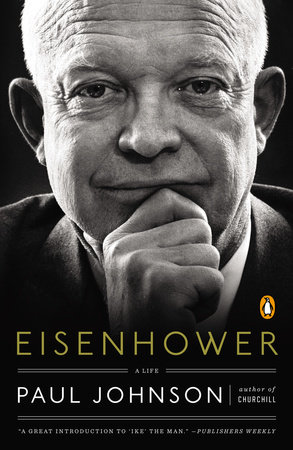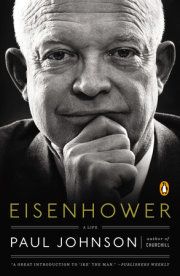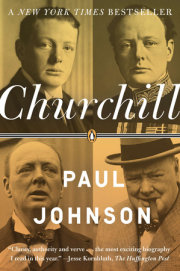PART ONE
Evolution of the Perfect Staff Officer
Dwight David Eisenhower was born on October 14, 1890, the third son, out of a total of seven sons, of David Jacob Eisenhower and Ida Elizabeth Stover. His place of birth was Denison, Texas, but when he was one, his family moved to Abilene, Kansas. This is the place where he grew up and went to school, where he is buried and where all his documents are stored in the splendid Eisenhower Presidential Library.
The Eisenhowers, who were of German origin (the name means “iron hewer”), had come to what is now the United States in 1741. They were Mennonites, an Anabaptist sect that fled European militarism and practiced the austere virtues of primitive Christianity. The father, David, received 160 acres and $2,000 from his family, but lost it all when his business failed, an event that had a powerful impact on all his boys. He was deeply religious and read the Bible in Greek, but he ruled with a stick. When Ike, as he was always known, was asked at a press conference in July 1954 about his pacifist background, he replied, laughing, “There was nothing pacific about my father.” His mother, on the other hand, who played the piano and taught the boys hymns, was a passionate pacifist who wept when Ike went away to West Point, though she accepted it as God’s will. His brother Milton recalled: “I never saw my mother cry until Ike became a cadet.”
Ike’s father worked at an Abilene creamery on Mennonite land. The family read the Bible, morning and evening, on their knees. But Ike, as an adult, never belonged to a church until he became president, when he was baptized at the Washington, D.C., National Presbyterian Church, “to set an example.” But his life was always conducted within highly disciplined channels. As a boy he rose at five a.m. to lay and light the fires. Throughout his adult life his diaries record that he habitually rose at six, and on many days worked till eleven p.m. “Seven hours’ sleep is plenty,” he would say. Abilene was a community that encouraged personal industry. A former cow town with a colorful past, it prided itself on being self-policing, having no crime and all its males gainfully employed. Its four thousand inhabitants were Christians of European descent, most of whom voted Republican and conformed to Norman Rockwell patterns.
Ike had blue eyes, light brown hair, an infectious grin, which was his hallmark throughout his life, and a pugnacious and competitive character. He grew to nearly six feet with a weight of 170 pounds, which never varied much. He ate sensibly, drank moderately and got regular exercise. This took the form of football, at which he excelled until a knee injury forced him to switch to coaching. His coaching skills became a huge asset in his military career, and he kept fit by taking up golf, a passion that never left him, even after he achieved a hole in one (February 6, 1968). He always stressed teamwork, as coach, general and president. He was self-assured but never conceited—humility was a much-prized Mennonite virtue. He loved hunting, fishing and camping, and he organized sporting trips. The Eisenhower boys helped one another to get through college by earning money in turn. Ike’s original plan was to study law at the University of Michigan, which had one of the best football teams in the country, but his friend Everett Hazlett, with whom he exchanged letters for half a century (they are published), persuaded him to get a place at the United States Military Academy at West Point, which was free. Two applicants each year were recommended by the local U.S. senator, Joseph Bristow.
The senator held an annual competitive exam for which Ike crammed. It was exactly the kind of challenge he liked, a two-day contest involving eight bright local boys. He got 99 out of 100 in grammar, 94 in algebra, 96 in arithmetic, 90 in spelling, 79 in general history, 73 in U.S. history, 77 in geometry, and 90 in geography, and with an 87.3 average, he won a place. He always liked history and, as a boy, read a great deal of Greek, Roman and American history—and remembered it. One of his presidential speechwriters, the learned Arthur Larson, known as the Republican egghead, recalled Ike correcting him when he referred to Alcibiades the Just. “No, Arthur, you mean Aristides the Just.” Ike loved reading about Lincoln, and learned passages from his main speeches by heart. From military history he loved to quote Robert E. Lee’s obiter dicta, especially his key saying: “Duty is the most beautiful word in the English language.”
Ike worked through the full four-year course at West Point, during what he claimed was the toughest period in its history, just before the United States entered the First World War. The life was spartan, but this was nothing new. Rote learning was the rule. Ike excelled at English and was at the top in essay writing. His talent for coaching was fully exploited and he became more devoted to teamwork, which became a salient part of his philosophy of life. He found the school fascinating: Lee’s room, Grant’s room, the field where Custer learned to ride. His first year as a plebe, which involved much hazing by senior cadets, was redeemed by ceremony and bands, which Ike relished. As a senior himself he never hazed plebes. He hated regimentation for its own sake. His only black mark was for smoking, strictly forbidden, which meant he was 125 out of the total intake of 164 under “discipline.” His overall final position was 61 out of the 164 graduates, of whom 59 eventually became brigadier generals (one star) or higher, two of them generals of the army (five stars). Ike enjoyed West Point and greatly benefited from it. His knee injury ruled out the cavalry, so his first posting, as a second lieutenant, was to the infantry at Fort Sam Houston, Texas, in 1915.
Ike developed one lifelong characteristic at West Point: a tendency to conceal any intellectual interests or cerebral accomplishments. “Academic” was a term of abuse at the Academy. He liked to be considered a “regular guy” and took to reading Westerns to hide his passion for military history. This curious practice became habitual. Richard Nixon said to me: “I served General Eisenhower as his Vice-President for eight years. He was by far the most devious man I ever met in my life.”
He was also exceptionally well mannered and courteous. He was capable of ferocious bouts of temper, but these were kept under strict control and unleashed only when required for a definite purpose. All this he owed, in the first instance, to his wife, whom he married in July 1916. Mamie Geneva Doud was born in Boone, Iowa, but the family moved to Denver when Mamie was seven, and that is the place with which she identified. Her father had made a modest fortune in meatpacking, and the family was affluent. Her father employed a chauffeur, and Mamie had her own lady’s maid. At sixteen she was sent to Miss Wolcott’s finishing school, Denver’s “prime academy for young ladies.” She thought Ike “the best-looking man I had ever met,” and while determined to marry him, she was also clear about the ways in which he could be improved. She spotted immediately that he was a man of unusually high intelligence with a strikingly wide vocabulary, but she removed many rusticities from his manners and accent and the rough traits he had acquired at West Point. As she had a horror of flying, she also forbade his half-formed notion of becoming an army flier (he had begun taking lessons) and got her father to tell Ike that the marriage could not take place unless he renounced any such ambition (Ike complied).
“It was a case,” Mamie said, “of someone from a family of boys mating with someone from a family of girls—I had three sisters and no brothers.” They had quite a hard time of it living on army pay. They moved more than twenty-five times in Ike’s army career, and never owned a house until they bought their retirement home, a farmhouse at Gettysburg, Pennsylvania. “I learned a lesson, early,” she confessed ruefully. “Our first big move, I sold the household furniture, which included some valuable wedding presents. I thought it would be simpler. All I got was $95! It took us years and years to replace them properly. So in future I never parted with anything. Put it into storage, if necessary, and filled the attic with old clothes.”
Mamie was tremendously important to Ike at every stage of his life and career. They got on because each respected the other’s markedly different habits. Ike never got up later than six a.m., except in very unusual circumstances. Mamie preferred, like Churchill, to do her administrative work in bed and rarely rose before ten a.m. or even noon. As they advanced up the pyramid, Mamie regarded Ike’s working times and areas as sacrosanct and never penetrated them. “When Ike was President I only went into the Oval Office four times, and each time I was invited.” On the other hand, she had a remarkable memory for faces and names, was a frugal housekeeper, however large the establishment, and kept everything that was within her province under tight control. J. B. West, the chief usher at the White House, said: “She had a spine of steel, formed by years of military discipline. She understood a large household, knew exactly what she wanted every moment and exactly how to get it done.” She trimmed down the staff, imposed a no-talking rule and kept her own schedules strict military secrets.
Ike himself asserted, of his presidency: “She made the White House livable, comfortable, and meaningful.” And: “I got it into my head I’d better listen when she talked about someone brought in close to me.” And: “I always sought Mamie’s advice on financial matters. She was keen on budget savings. Yes, Sir!” Mamie was never pretty, but she was always trim and did Ike credit. With a height of five feet four inches and about 135 to 140 pounds in weight, which never varied much, she was named in 1952 one of the best-dressed women in the world by the New York Dress Institute. She popularized short bangs, pastel-colored stockings and Elizabeth Arden’s Main Chance health spa in Phoenix, Arizona. When Ike ran for office, rumors flew that Mamie drank. Someone had the hardihood to raise the issue at a press conference in 1953. Making a visible effort to control himself, Ike said: “To the best of my knowledge, Mrs. Eisenhower has not had a drink for eighteen months.” But it was Mamie herself who finally laid the issue to rest in 1973 during a TV interview, when she said that a carotid sinus condition sometimes affected her balance. (She also suffered from a mild form of claustrophobia.) This would explain why she was sometimes said to be unsteady on her feet. Whether alcohol ever contributed to this behavior is unclear: the evidence is contradictory. She was never a chronic drunk—far from it—and my view is that the stories about her drinking were invention, circulated by political enemies of Ike’s who found him an extraordinarily difficult man to attack on personal grounds.
What is indisputable is that Mamie made Ike a good and loving wife and was a distinct asset in his career, especially in its early stages. While the First World War lasted, Ike prospered mightily. From Fort Sam Houston he was sent to Fort Oglethorpe, Georgia, as an instructor in the Officers’ Training Corps, and promoted to captain, then sent to Fort Leavenworth, Kansas. He then became involved in the Tank Corps, a rapidly expanding branch of the army, first at Gettysburg, then at Camp Meade, Maryland. His enthusiasm led to rapid promotion, first to major, then to lieutenant colonel. He was on notice for overseas service when the signing of the armistice in November 1918 suddenly put military expansion into reverse. Ike found himself returned to his substantive rank, captain, then promoted to major, in which he remained for sixteen years.
Moreover, his keenness for armored warfare was ill regarded by his superiors, who stigmatized it as arrogant and impertinent, especially as he was still nominally an infantryman and without battle experience of any kind. His application to attend the Command and General Staff School at Leavenworth was savagely turned down, and instead he found himself executive officer of the Twentieth Infantry Brigade in the Panama Canal Zone.
This disappointment, however, turned out to be a blessing. It brought him to the attention of General Fox Conner. This gifted and unusual man was the first of Ike’s guardian angels in his career. He had been chief of staff to General John J. Pershing, was a staff officer of exceptional brilliance and recognized the same propensities in others. He could see that Ike was a born staff man with an unusual combination of qualities. Conner reported that Ike was precisely the kind of officer who ought to attend the Staff School, and saw to it that he went there in 1925. Ike loved the school and came out first when he graduated the following year.
What were the qualities Conner spotted? First was a clear, analytical intelligence. Second, he had the ability to articulate conclusions in excellent English—any kind of paperwork came naturally to him. Third, he could get on well with anyone, especially hard cases—which were common in an army where thrusting individualism was encouraged and promoted. He was, fourth, adept at resolving differences and promoting solutions, especially compromises that worked. Fifth, he had admirable persistence in pursuing reason in any military enterprise. Sixth, he concealed his strengths. Seventh, Ike was very hardworking, often for prolonged periods, yet he always appeared relaxed. All these qualities were bound together by an eighth virtue: consistent aims in life, quietly but vigorously followed. The effect of the Staff School was to confirm this combination, and especially to enable Ike to get his thoughts onto paper in a pellucid manner, something very rare in the U.S. Army, indeed in any army. It also implanted in Ike a keen realization of the connection between military power and industrial capacity, which became a salient part of his thinking about the future.
Ike’s high ratings at the Command and General Staff School should have ensured him a wide choice of military posts when he graduated. And indeed for a short time in 1926–27 he was commander of the Second Battalion of the Twenty-fourth Infantry. But he then chose to serve on the American Battle Monuments Commission, under the auspices of the Army War College. This took him to Washington, D.C., and to its Paris headquarters, for the best part of 1928 and into 1929. As Ike often complained that his one aim was to serve with battle troops, it may seem curious that he volunteered for this post. The reasons are that it involved travel, which he and Mamie enjoyed; that it brought him into contact with senior officers from all arms of the service; but above all, that it involved tricky and arduous administrative tasks of a kind he was beginning to relish, and perform well.
An examination of letters written by Ike during his service on the ABMC shows him to have become a meticulously efficient administrative officer who wrote clear, correct and pungent English, and was an inveterate enemy of muddle, jargon and bureaucracy. A characteristic remark reads: “In my opinion we cannot afford to permit years of work in obtaining accuracy as to fact to be vitiated by looseness in expression. Exactitude is the primary consideration.” The post also allowed him to develop his style in dealing with tact and finesse with both superiors and subordinates. “Ike was in a job where emotions ran high,” said a colleague, “but he contrived to make many friends—and no enemies.” In recognition of his first-class service with the Commission, his next posting was as executive assistant to the assistant secretary of war, in Washington, D.C.
This brought him to the heart of things at the War Department, and he was there from November 1929 to February 1933. His task was industrial mobilization, his chief duty being to prepare plans for making optimum use of the nation’s resources, including raw materials and manpower, in the event of a major war. He said he was “looking forward to the opportunity of learning something about the economic and industrial conditions that will probably prevail in this country in the event of major war.” He also supplied staff support to the War Policies Commission, and in this body he moved close to two men who became among his warmest admirers: the future generals Leonard Townsend “Gee” Gerow (“my best friend for years”) and Wade Hampton “Ham” Haislip. The latter was the great expert on budget and legislation, and laid the foundations of what became Ike’s encyclopedic knowledge of how Congress worked and how to put the army’s case to politicians.
. All rights reserved. No part of this excerpt may be reproduced or reprinted without permission in writing from the publisher.










